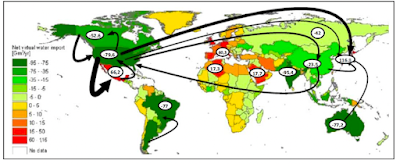THE VIRTUAL SOLUTION FOR ALGERIA
The prior blogs have covered the conventional approaches in resolving water scarcity and improving food security. This blog uses the example of Algeria to discuss a lesser-known strategy of virtual water-trading and its role in overcoming the challenges of water shortages.
 |
| Figure 1: Net virtual water import flows related to agricultural and industrial goods (Nabil 2021) |
What is virtual water trading?
The term ‘virtual water’ was first coined by Tony Allan in the 1990s (Allan 1998) used to describe the volume of water needed in the production of a commodity (Antonelli and Tamea 2015). Allan used the term to illustrate how countries can overcome their water deficits by trading the water embodied in food crops. For example, to produce 1 tonne of wheat a 1000m3 of water is required, therefore importing 1 million tonne of wheat is comparable to importing 1 billion m3 of water (Wilchelns 2001). Importing water intensive goods such as wheat from countries with ample water resources thus allows water-scarce nations to relieve pressure on their limited supply, while diverting water resources to other urgent needs such as domestic consumption (Hoekstra 2003).
The video below as a great starting point in understanding the importance of virtual water markets.
So, why turn to virtual water trading?
For arid countries such as the Middle East and North Africa (MENA) where the lack of rainfall combined with the effects of climate change has led to an overreliance and depletion of groundwater resources (Antonelli and Tamea 2015), virtual water trading sounds like the perfect solution to the growing threats to food production. The figure 1 above shows the net virtual water flows, where Algeria can be seen as the largest net importer in Africa continent between 1996-2006.
Virtual water trade: the answer to water scarcity in Algeria?
Conclusion:
Virtual water in the form of food trade is an effective approach to redistribute water across the globe. It can play a significant role in improving food insecurity as suggested by Konar and Caylor’s (2013) study in Africa which linked increased virtual water trade to lower levels of undernourishment. On the other hand, an over-reliance on international markets for food supply can threaten a country’s national security. Embracing a virtual water trade strategy is synonymous to giving up food independence (Nabil 2021). This means that unforeseen events can have a significant effect on the food market, frequently leading to surges in the prices of agricultural goods. Hence, I believe that virtual water trade is only a viable solution when food prices are lower relative to the cost of production in the water-scarce country. As for Algeria the unproductivity of agriculture leaves virtual water trade as the only solution in overcoming food insecurity, illustrated by the progressive decline in cereal production in figure 2.
 |
| Figure 2: National food needs, production and imports in Algeria (Zella and Smadhi 2020) |

Comments
Post a Comment